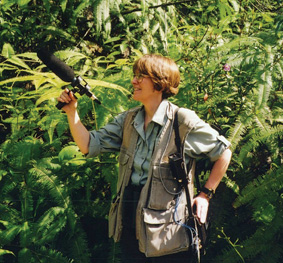Linda Macaulay wins award for contributions to Cornell Lab of Ornithology and science
By Krishna Ramanujan

Linda Macaulay, one of the world's foremost bird recordists and an associate at the Cornell Lab of Ornithology, has spent more than 30 years risking her life with lions, hippos and even armed rebels to record bird and animal sounds, many for the first time.
Macaulay's almost 6,000 individual birdsong recordings, representing 2,668 species, have taken her to more than 50 countries. All her recordings are archived in Cornell Lab of Ornithology's Macaulay Library, named after Macaulay and her husband, William Macaulay. The library is the world's largest archive of animal sounds and associated video, which are publicly available online.
For her recording work, the lab presented Linda Macaulay with the Arthur A. Allen Award for Outstanding Service to Ornithology April 8 in New York City. Allen was the lab's founder and director for 50 years.
"By virtue of her travels and interest in the world, Linda quickly realized she could make a fundamental contribution to ornithology by getting to these places and recording birds," said John Fitzpatrick, the Louis Agassiz Fuertes Director of the laboratory and professor of ecology and evolutionary biology, speaking about how Macaulay first became interested in recording in 1987. "The recordings that she has made are some of the best that we have," he added.
"When you can pair traveling and seeing nature and these birds with something that contributes to the science, that makes it a quest, and something that people will value," said Macaulay, who lives in Greenwich, Conn.
Macaulay started recording when she and her husband took part in a bird tour in Kenya organized by the lab. Soon after she witnessed how Greg Budney, the Macaulay Library's curator, recorded birds in the field, she bought a recorder for her husband. But he never used it, so she picked it up, and with Budney's guidance, began recording birdsongs.
"She's a great example of how individuals who are not professionally trained can make enormous contributions to professional ornithology," said Fitzpatrick.
Macaulay always conducts meticulous research before each trip. "I always have a list of the species recordings that the library does not have," she said. "By identifying what the library does not have, I put together a target list," researching where the birds live and sending that information to local guides in advance. "We always get recordings of more than 50 percent of the list," she said.
Some of her trips' highlights include sitting with gorillas and walking through floating mats of razor grass to record shoebills in Rwanda; boating up remote river areas in Gabon to record cave-dwelling gray-necked rockfowl; getting the first recordings of Whitehead's Trogons in Malaysia; and recording the blue, red and green African pitta in Zimbabwe and Malawi, and capturing the males throwing themselves off branches in colorful and sonorous courting displays to entice females to select them as a mate.
One non-avian highlight includes finding armed thugs upon their arrival at a remote mountain hotel in western Ivory Coast and a large table covered with machine guns, rifles and handguns in the hotel's restaurant. At another table was warlord and Liberia's future president Charles Taylor meeting with Americans.
But undeterred, the couple have persisted. On each trip, Macaulay notes locations, ranges and bird song variations, while her husband, cofounder of the private equity company First Reserve, an avid birder and a Cornell Lab of Ornithology donor, jots down detailed descriptions of the birds.
"Linda is keenly aware of the world and understands that she has a role to play," said Budney. "It's remarkable that she has picked up a recorder and has done so much for ornithology and conservation," he added.
Media Contact
Get Cornell news delivered right to your inbox.
Subscribe